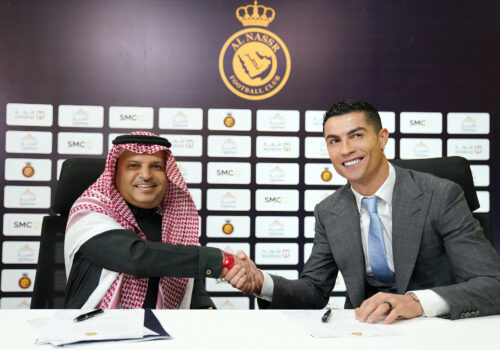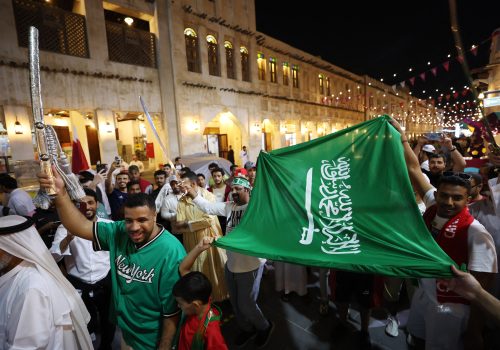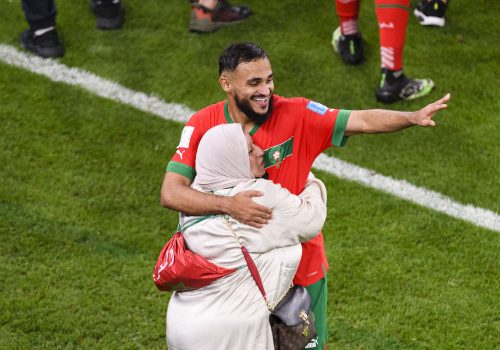The real reason the Saudi government is investing in sports. Hint: It’s not to impress you.
Saudi Arabia’s recent sports-related investments—including over $1 billion in the Professional Golf Association (PGA) Tour (if a deal is finalized) and hundreds of millions of dollars to recruit soccer stars to play on Saudi-based teams or be tourism ambassadors—have led to accusations of “sportswashing” or attempting to improve its international image through sports.
While Saudi Arabia does seek to boost its reputation as part of a broader effort to reform its economy and increase tourism, sportswashing is not the most useful way to analyze Saudi Arabia’s recruitment of top sports talent or its creation of LIV Golf.
Understanding the changes occurring in Saudi Arabia is critical for US policymakers and American companies, especially since more big Saudi sports investments are likely around the corner and Riyadh is part of a changing “middle power” geopolitical landscape. The negotiations around the PGA/LIV merger passed a December 31, 2023 deadline but are continuing, with reports that US investors may join the new entity.
Sports investments as part of the Kingdom’s broader strategy
Saudi Arabia’s big financial bets in the sports world are part of its broader Vision 2030 plan to diversify the economy away from oil, create more private sector jobs for Saudi people (not just expats), and ensure a sustainable future for the Kingdom when the oil eventually runs out.
Crown Prince Mohammed Bin Salman Al Saud (MBS) is highly motivated to achieve the ambitious goals in his Vision 2030. The current war between Israel and Hamas is unlikely to derail MBS’s focus on driving forward his reform and development agenda. Sixty-three percent of Saudi Arabia’s population of over thirty-two million is under the age of thirty, so if the reforms are not successful by the time the oil has run out, the Kingdom will face serious challenges.
MBS is focused on metrics and performance; he said in a September 2023 interview he doesn’t care about sportswashing criticism so long as his strategy yields the results he wants, such as GDP growth.
Sports for All (SFA) is the Saudi government initiative responsible for driving progress on the Vision 2030 targets relating to sports. It was launched in 2018, and it has specific strategies for every age group from young people to older adults. Interestingly, SFA specifically targets housewives of all ages and has released official regulations that require the use of feminine words whenever masculine words are used to ensure sports are presented as open to both men and women. SFA’s goals include: 1) motivating people from all walks of life and at all levels of capability to be healthier, 2) increasing community-wide physical activity level and opportunities to socialize through sports, and 3) working through the private sector to achieve the overall growth in sports and physical activities in the Kingdom.
As SFA President Prince Khaled bin Alwaleed explains, SFA’s “mandate [is] to have 40 percent of all people in Saudi active by 2030.”
Sports reforms in Saudi Arabia positively impact regular people, especially women
Many Americans still associate Saudi Arabia with three things: the September 11 terrorist attacks, its war in Yemen, and the murder of Washington Post columnist Jamal Khashoggi. Many also rightly have serious concerns about Saudi Arabia’s human rights record. So it’s unsurprising that when Saudi Arabia’s sovereign wealth fund, the Public Investment Fund (PIF), wanted to buy the PGA in June 2023, the US public reaction was to connect this to what it knows of the Kingdom. Considering how lasting those negative associations have been, it’s difficult to imagine how an investment in a US sports tournament could “wash” that away.
SIGN UP FOR THE THIS WEEK IN THE MIDEAST NEWSLETTER
If you ask Saudis, especially women, about why their government is investing in sports, what you may also hear is that it has opened a pathway to health, fitness, and careers unimaginable a decade ago. For others, it provides opportunities to children their parents didn’t have, including exercising in school. And for many—young and old—it’s cultivating a sense of personal aspiration and civic pride as they watch their national teams compete.
When Saudi first licensed gyms for women in 2017, 40-year-old Sara Rahimaldeen was one of the first to join. As a young mom to two children, she wanted to do something to “regain her energy,” as she told one of us. Six years later, Sara now trains as a competitive athlete and has a career as a coach and personal trainer. “Now I’m changing people’s lives just as my life was changed,” Sara said.
In 2017, the right to obtain driver’s licenses opened up opportunities for female Saudi athletes. Two years later, Reema Juffali, the first Saudi woman to hold a racing license, participated in an international racing competition hosted in the country. In 2020, Saudi Arabia hosted its first professional international golf tournament—the Ladies European Tour—where Saudi women played alongside international female players. “Before we could drive, we had to go out to the outside of the city at four in the morning to run,” Sara recalled. “And it was so difficult to convince someone to take us.” Now, the government organizes public marathons through the recently launched triathlon federation, where men and women run in the streets side by side.
The same year that local municipalities issued business licenses for women’s gyms, the Education Ministry allowed physical education in schools for girls and boys. Kevin Kerns, a former American tennis player who competed in the US Open, recently started teaching tennis at schools across Saudi Arabia. He initially launched the tennis training program in thirty schools and expects to roll it out to 290 schools this year, reaching over 70,000 kids. “Tennis is more than a sport. It teaches goal setting, how to work with others, and life lessons on winning and learning. We’re teaching kids to engage in sports for a lifetime,” explained Kevin to one of us.
Changing geopolitical reality and the need for a new US approach
The United States needs to recalibrate its approach to middle powers such as Saudi Arabia to take into consideration new geopolitical and domestic political dynamics. As the United States faces more competition from China and from middle powers banding together in blocs such as BRICS—which Saudi Arabia and the United Arab Emirates recently joined—it needs to recognize that trade-offs will be the new normal for successful US strategy.
Saudi Arabia’s sports investments are a useful case study of how the United States needs to alter its policy approach. Here are the critical elements of a new way forward:
- The US government and human rights organizations criticized the Kingdom in the past for preventing girls from playing sports and not permitting women to work out at gyms. Saudi Arabia has radically changed its approach: gyms that allow women now abound; girls now play sports in school; and Saudi women athletes are competing internationally. The United States should see Saudi investment in sports as part of a broader win for millions of Saudi women and girls—not to mention men—in terms of personal freedom, health, and leadership development.
- Sports can be a way to bridge divides, organize collaboratively, develop people-to-people networks, and improve business and government relations. This includes continuing to fund sports diplomacy programs through the State Department to train coaches and referees, as well as sharing American expertise on nutrition, sports psychology, and the entertainment infrastructure needed to support sports, to name just a few areas where partnerships can take place. These types of partnerships can be good for American companies and can also nurture important relationships that can impact societal change.
- The United States often tells Saudi Arabia and other middle powers what it doesn’t want them to do. Lately, growing close to China has been a major concern. Situations—like the potential investment in the PGA Tour—where Saudi Arabia is seeking a partnership that China cannot offer and that does not harm US national security interests or go against US values should be seen as a win for the United States and an opportunity to lead.
- The United States needs to consider the self-interested motives of countries rather than viewing every policy decision as a referendum on its relationship with the United States. The Kingdom saw golf as a sport ripe for a shake-up and knew, with their deep pockets, that they were well-positioned to make a move that could help them achieve their broader tourism and entertainment development goals. It’s not all about the United States: Saudi Arabia is considering similar investments in countries such as India, where PIF has “expressed an interest” in acquiring a multi-billion dollar stake in a major cricket league.
- Saudi Arabia will be more persuaded by arguments that speak to their national interests rather than appeals to follow international norms or threats about withdrawing American support. Human rights violations reduce the appetite for foreign investment and association with the Kingdom. American companies and government officials can remind Saudi counterparts of the potential reputational and economic consequences if they commit such abuses. US negotiators working with PIF on the merger should also emphasize the massive negative blowback that would occur if golfers are prevented from speaking their minds or if other controversial restrictions are put in place. To avoid these issues, US negotiators should also ensure a strong governance structure for the new golf entity.
If Americans persist in seeing Saudi sports investments primarily as “sportswashing,” they will be scoring own goals. The Saudis will not end their investments in this sector or in many other sectors of the US economy, such as the 60 percent stake it holds in Lucid Motors or its significant investments in Activision Blizzard and Uber. Instead, US-Saudi tensions will cause rifts among athletes, sponsors, and fans, and may preclude cooperation that could be a win-win.
Sovereign wealth funds in the Gulf have over $5 trillion in assets, with expected upward growth continuing. If the United States wants to encourage more investment in US companies and global infrastructure projects—as the Joe Biden administration reportedly does—it is essential to understand the multifaceted motivations of these countries, as well as the human and economic potential of their citizens rather than relying solely on past negative tropes.
The PGA Tour contends that LIV Golf would have eventually run them out of business if a deal with PIF had not been reached. Saudi Arabia is flexing its sports investment muscles globally and playing the long game, like when it was the only bidder for the 2034 World Cup. Negotiating partnerships on sports that both sides can live with is an example of the kinds of trade-offs that the United States should accept to achieve its broader national security goals in this volatile, multi-polar world.
Stefanie Hausheer Ali is a nonresident fellow with the Atlantic Council and a senior director at the international strategic advisory firm Rice, Hadley, Gates & Manuel LLC. The information in this article represents the views and opinions of the author and does not necessarily represent the views or opinions of Rice, Hadley, Gates & Manuel LLC.
Jaime Stansbury is a vice president at The Cohen Group and was formerly the executive director of the American Chamber of Commerce in Saudi Arabia. The opinions and characterizations in this piece are those of the author and do not necessarily represent the views or opinions of The Cohen Group.
Further reading
Wed, Jan 3, 2024
Gulf states are vying for sports fans’ hearts and minds—one sovereign wealth fund at a time
MENASource By Joze Pelayo
In 2023, the annual tennis tournament colloquially called the Washington Open was renamed the Mubadala Citi DC Open thanks to a sponsorship from Abu Dhabi-based Mubadala Investment Company—an unknown name to most Washington sports fans, but one they may see again. The Gulf Arab states have been turning their efforts and attention to Beltway sports amid […]
Fri, Dec 2, 2022
Saudi Arabia lost at the 2022 World Cup. But its sports sector is winning.
MENASource By
The sports sector is one of the vital pillars of Saudi Vision 2030 and the Ministry of Sport’s dedication is tangible in Saudi Arabia, where one can witness the enhanced facilities and increased citizen participation in sports.
Wed, Dec 14, 2022
Morocco’s World Cup victories are historical revenge for subaltern dreamers from the global south
MENASource By Sarah Zaaimi
The defeat-free journey of the Moroccan soccer national team, the Atlas Lions, is more than a simple sports score.
Image: Soccer Football - Al Nassr unveil new signing Cristiano Ronaldo - Mrsool Park, Riyadh, Saudi Arabia - January 3, 2023 New Al Nassr signing Cristiano Ronaldo during his presentation REUTERS/Ahmed Yosri


